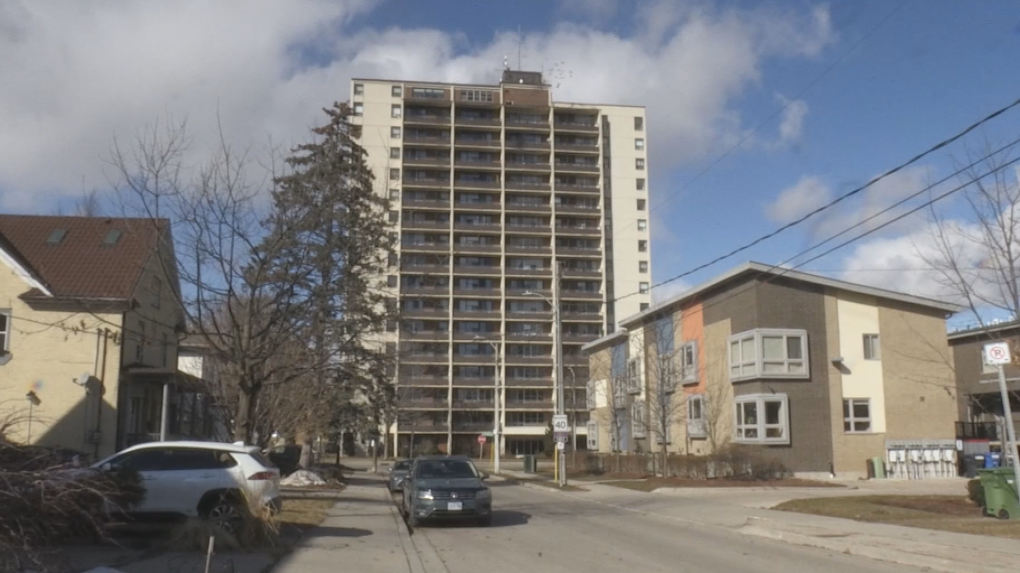Kitchener tenants get eviction notices, advocacy group says owner has done it before
A tenant’s rights advocacy group is voicing its concern about evictions at a large Kitchener apartment building.
A new owner took over 250 Frederick St., a 17-storey building near Lancaster Street, in October 2023.
Almost four months later, residents are feeling uneasy.
“I heard that some tenants got eviction notices to move out,” said Maciej Deoniziak, who’s lived in the building for more than 16 years. “The reason is that [the owner] wants to renovate the units.”
More than 100 people live at 250 Frederick St.
“We are very afraid that the rent might go up,” Deoniziak added.
He said many of the residents are seniors.
“I’m retired, I’m on a pension. So I won’t be able to afford to live here anymore. Actually, nowhere, because the rent is skyrocketing everywhere.”
Tenants group reacts
Ryan Murdock works with the local branch of Acorn, a tenant’s rights advocacy group.
“What happened is that landlord bought this building and has now started a process of evicting tenants, delivering N-13 notices to select tenants,” he explained.
 250 Frederick St. in Kitchener, Ont. (Jeff Pickel/CTV Kitchener)
250 Frederick St. in Kitchener, Ont. (Jeff Pickel/CTV Kitchener)
Acorn alleges the new owner, a numbered company, has done this before in London.
Last year, tenants there protested their evictions from the Webster Street apartments.
“You force people out of their homes, their houses, just so that you can raise the rent and try to catch up to the so-called market value,” Murdock explained.
Some of the tenants at 250 Frederick St. are meeting with Acorn representatives this week to take a look at their options.
Call for action
Acorn is urging elected officials, from all levels of government, to step up.
“A lot of these issues have fallen on the municipalities who, in their own way, have failed to act and assume the responsibility that is there still,” said Murdock. “But the provincial government has also abdicated responsibility.”
Unless action is taken, Acorn believes this will happen again.
“Because if you already live in affordable housing and then people force you to move, where do you move?” Murdock said.
Acorn is calling for a landlord registry so tenants can easily identify who their landlord is and open up lines of communication.
CTV News attempted to find and contact a representative for the new owner but were not able to do so.
Rise of renovictions
A renoviction is when a landlord evicts their tenants, citing renovations as the reason. Whether they complete that work or not, the new tenants who move in end up paying a higher rental rate.
Renovictions have gotten more attention recently due to skyrocketing housing costs.
MORE: Tips for tenants experiencing a renoviction
On Jan. 17, Hamilton became the first Ontario municipality to implement an anti-renoviction bylaw.
Speaking to CTV News before the decision, Monica Ciriello, the director of licensing and bylaw services for the city, said it “would require all landlords city-wide to obtain a renovation license from the city prior to commencing any renovation work that requires an N-13 notice to be issued to a tenant.”
“We recognize, as a local government, we can’t prohibit a landlord from issuing an N-13, but we can use it as a starting point to obtain a municipal renovation license,” she added.
CTVNews.ca Top Stories

Trump threatens to try to take back the Panama Canal. Panama's president balks at the suggestion
Donald Trump suggested Sunday that his new administration could try to regain control of the Panama Canal that the United States “foolishly” ceded to its Central American ally, contending that shippers are charged “ridiculous” fees to pass through the vital transportation channel linking the Atlantic and Pacific Oceans.
Man handed 5th distracted driving charge for using cell phone on Hwy. 417 in Ottawa
An Ottawa driver was charged for using a cell phone behind the wheel on Sunday, the fifth time he has faced distracted driving charges.
Wrongfully convicted N.B. man has mixed feelings since exoneration
Robert Mailman, 76, was exonerated on Jan. 4 of a 1983 murder for which he and his friend Walter Gillespie served lengthy prison terms.
Can the Governor General do what Pierre Poilievre is asking? This expert says no
A historically difficult week for Prime Minister Justin Trudeau and his Liberal government ended with a renewed push from Conservative Leader Pierre Poilievre to topple this government – this time in the form a letter to the Governor General.
opinion Christmas movies for people who don't like Christmas movies
The holidays can bring up a whole gamut of emotions, not just love and goodwill. So CTV film critic Richard Crouse offers up a list of Christmas movies for people who might not enjoy traditional Christmas movies.
More than 7,000 Jeep SUVs recalled in Canada over camera display concern
A software issue potentially affecting the rearview camera display in select Jeep Wagoneer and Grand Cherokee models has prompted a recall of more than 7,000 vehicles.
'I'm still thinking pinch me': lost puppy reunited with family after five years
After almost five years of searching and never giving up hope, the Tuffin family received the best Christmas gift they could have hoped for: being reunited with their long-lost puppy.
10 hospitalized after carbon monoxide poisoning in Ottawa's east end
The Ottawa Police Service says ten people were taken to hospital, with one of them in life-threatening condition, after being exposed to carbon monoxide in the neighbourhood of Vanier on Sunday morning.
New York City police apprehend suspect in the death of a woman found on fire in a subway car
New York City police announced Sunday they have in custody a “person of interest” in the early morning death of a woman who they believe may have fallen asleep on a stationary subway train before being intentionally lit on fire by a man she didn't know.


































